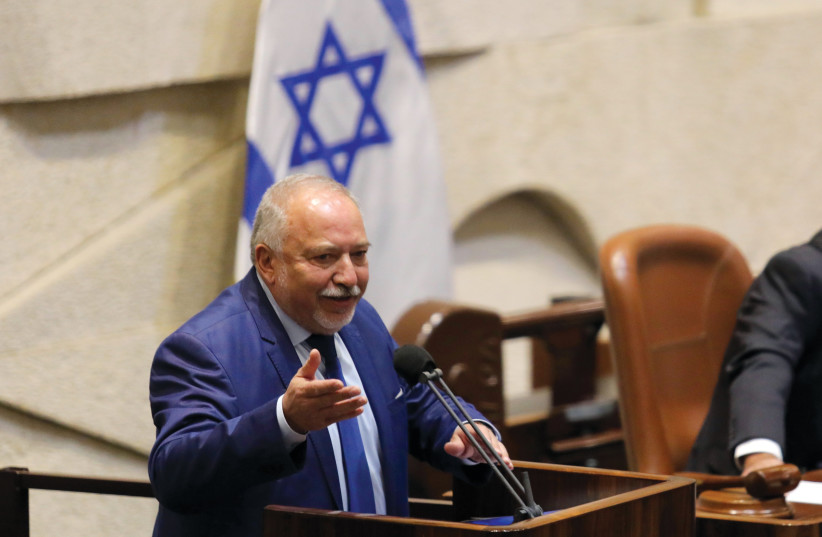In the early hours of November 4, for the first time in more than three-and-a-half years, the Knesset passed a state budget, marking a key victory for the government of Naftali Bennett which enjoys a wafer-thin parliamentary majority.
The 2021 budget was passed with 61 voting in favor and 59 against, after a marathon all-night session.
The Knesset reconvened the following day to pass the 2022 budget and the Economic Arrangements Law which includes a raft of reforms: increasing the retirement age for women from 62 to 65 over 11 years; imposing a congestion charge for motorists entering the greater Tel Aviv area; easier regulation of imported consumer products and opening the kashrut certification market to competition in January 2023.
When the broad-based coalition consisting of no less than eight disparate parties from across the political spectrum – described as the most bizarre in Israel’s history – was sworn in in June, it was clear that the key test would be to pass the state budget. The 2021 budget needed to pass into law by November 14 to prevent the Knesset from being automatically dispersed, which would have initiated elections in February. In the end, it was passed ten days ahead of the deadline.
The threat that the opposition would pull a last-minute surprise and recruit a defector from the coalition to defeat the government vanished. Now that the budget hurdle has been successfully overcome the immediate threat of the coalition imploding has been removed.

After more than 140 days the coalition received a semblance of stability. After the passage of the budget, Prime Minister Naftali Bennett promised that he would fulfill the prime ministerial rotation agreement with Foreign Minister Yair Lapid in September 2023 and that the government would last its full term.
He said the government would now be able to concentrate on issues that have long been neglected, citing property prices, traffic congestion, the cost of living, widespread crime and a lack of governability in the Negev as issues that would be prioritized.
Bennett said the government had steered the ship into calm waters. “Tonight we put Israel back on track,” he said. “This is a day of celebration for the State of Israel. After years of chaos, we formed a government, overcame the Delta variant, and now, thank God, we have passed a budget for Israel. We’ll keep going, full-steam ahead.”
“The Netanyahu era is over,” declared New Hope minister Zeev Elkin.
Coalition head Idit Silman cheered the coalition members who demonstrated exceptional stamina throughout the all-night marathon sessions voting on hundreds of objections. “This budget proved that consensus can be reached for the benefit of the people and the country.”
The Likud predicted that after the passage of the budget the chances of the coalition falling apart had actually increased. “After getting Bennett and Lapid’s terrible budget passed – which will drive up prices, raise taxes and transfer tens of billions of shekels from Israeli citizens to the Islamic Movement – the chances that the government will collapse have increased.”
Shas leader Arye Deri said “The government of the self-satisfied passed a bad budget that is entirely a brutal and deliberate blow to the elderly, the weak, the residents of the periphery, and families with lots of children.”
Religious Zionist Party leader Bezalel Smotrich vowed to continue the fight. “We lost this battle, but with God’s help we will win the war.”
Passage of the budget came nearly five months after Bennett’s government took office, replacing Benjamin Netanyahu following four inconclusive elections in two years.
Finance Minister Avigdor Liberman said this was the first budget passed in three and a half years “because of the personal interests of one man, who was willing to sacrifice Israel’s economy for his own interest,” in a reference to Netanyahu.

Netanyahu torpedoed a budget under his power-sharing government with Benny Gantz, leader of the centrist Blue and White, in order to bring down that coalition and avoid Gantz’s becoming prime minister under the terms of an alternating premiership deal.
As well as being a watershed moment for the coalition, the passage of the budget marked a resounding defeat for Netanyahu, raising speculation over his political future.
However, there is no indication at this juncture that he will step down from politics to concentrate on his ongoing corruption trial or that he would seek a plea bargain agreement before a new attorney-general is sworn in in February.
Finance Minister Liberman predicted that Netanyahu’s failure to prevent the approval of the state budget signaled the end of his control over the Likud.
“In my opinion, his magic is finished,” Liberman told Channel 12 News after the budget vote. “In the last three days in the Knesset, almost every Likud MK came up to me and said: ‘We were idiots for listening to him and not insisting on passing a budget.’”
Netanyahu met with his main challenger within the party, former Knesset speaker and health minister Yuli Edelstein and reportedly discussed the option of a Likud leadership primary early next year. Netanyahu is almost certain to win such a contest and his strategy appears to be to remain party leader and to continue to fight to topple the government.
Ironically, the fact that Netanyahu remains the leader of the opposition is the glue that is keeping the coalition together. None of the coalition party leaders, at this juncture at least, wants to risk an election that may result in Netanyahu’s return to power.
Key players in the coalition are politicians who were once Netanyahu’s closest partners and have now turned into his bitter foes: Liberman, his right-hand man in the 1990s; Bennett, his bureau chief when he was in the opposition and a senior minister in his cabinet; Gideon Saar, his number two and trusted political tactician; Ze’ev Elkin, who fulfilled the same role as Saar; and Benny Gantz, his alternate prime minister.
Leaders of the broad-based coalition deliberately put contentious issues to the side until the budget was passed. The danger now is that the coalition may begin to unravel in the post-budget period.
Any number of issues could potentially threaten the fragile coalition.
Meretz and Labor MKs have made it clear that they will oppose the plan to populate the Evyatar settler hilltop in Samaria.
A move by the US to reopen a US consulate for the Palestinians in Jerusalem is also likely to split the coalition. Speaking at a news conference after the approval of the budget, the prime minister said that “there is no place for an American consulate that serves the Palestinians in Jerusalem.” This had been conveyed to Washington “both by myself and by Foreign Minister Yair Lapid,” he said. Lapid endorsed Bennett’s position. “If the Americans want to open a consulate in Ramallah we have no problem with that.” But “sovereignty in Jerusalem belongs to one country — Israel,” he said.
Other potential landmines include questions of religion and state, such as the question of whether to operate Tel Aviv’s light rail on the Sabbath and Jewish holidays.
Defense Minister Gantz’s proposal for a committee of inquiry into the Netanyahu government’s purchase of submarines is another bone of contention.
Yamina is divided over Justice Minister Saar’s proposal to limit the terms for a prime minister and to ban criminal defendants from forming a new government.
And Interior Minister Ayelet Shaked still wants to pass a Citizenship Law that will prevent family reunifications for Palestinians married to Arab Israelis – a measure opposed by the Left and the United Arab List.
In short, there remains no shortage of contentious issues that could pose problems for the coalition in the months ahead. The passing of the budget was an important victory, no doubt, but significant challenges lie ahead.
